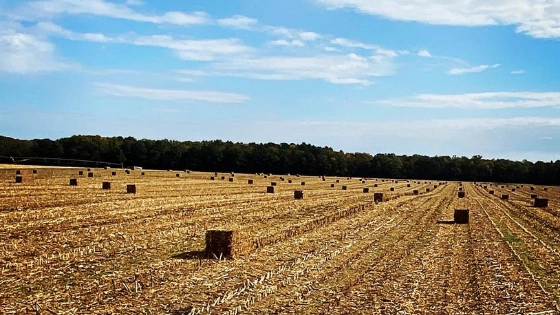 Jennie Schmidt is a registered dietitian turned farmer. She married into agriculture when she said, “I do” to her husband, Hans. She is now a full-time farmer and advocate for the industry.
Jennie Schmidt is a registered dietitian turned farmer. She married into agriculture when she said, “I do” to her husband, Hans. She is now a full-time farmer and advocate for the industry.
“I married into the farm and made farming my second career. I developed a love for it, especially the independence of the job and the reward of producing a harvest every year,” says Jennie.
Schmidt Farms Inc. in Sudlersville was established by her husband’s grandfather when he immigrated from Germany in the 1920s. “We currently farm close to 2,000 acres, which is mostly owned, some rented, as well as having several hundred acres of timber and conservation acres,” says Jennie, who farms with her brother-in-law, Alan.
The farm isn’t dependent on one crop. Instead, the Schmidt’s grow a variety of crops to provide different income streams. “Our farm is fairly diversified growing mostly corn and soybeans. Within the soybeans, we grow three different types — commodity beans, high oleic beans and tofu beans,” Jennie continues. “We also grow fresh market green beans, wine grapes that we sell wholesale to wineries throughout the Mid-Atlantic states, and all-natural hogs for a specialty meat processor in Pennsylvania.” The farm also implements sustainability practices, such as no-till farming and cover crops.
As a farmer and advocate for agriculture, Jennie has held multiple leadership positions, such as being the first female board member and first female president of the Maryland Grain Producers Utilization Board and a member of the Nominating Committee of the National Corn Growers Association. She is also the first woman to lead an advisory team for the US Grains Council. “My role as chair of the Middle East, Africa, Southeast Asia Advisory team for the US Grains Council is to develop policy and trade recommendations within that region for the Council to incorporate into their trade and export development strategies,” she states.
Although Maryland isn’t a large grain exporter, prices are based on the Chicago Board of Trade and effect Maryland farms as well. “When grain farmers have strong exports nationally, Maryland farmers benefit. Likewise, the same is true for the ethanol market. Even though we are not an ethanol-producing state, when ethanol markets increase corn demand, that benefits our Maryland prices,” she explains. Ethanol is used in personal care and household products, however it is primarily used as a blend in gasoline to help reduce vehicle emissions.
“We don’t farm in a silo and the U.S. agriculture economy is a global market,” Jennie continues. “Unlike many countries that cannot provide their poulation with food, the U.S. is a surplus producer and can meet the needs of countries that either do not have enough land or have the wrong type of land and growing conditions to produce the food they need.”
She also encourages other female farmers to look for mentors and to not be afraid to step out in leadership. “Your voice at the table for agriculture is needed,” Jennie says.
Hungry for more? Read about more female farmers, like Amy Tran, Andrea Schmidt and Jennifer Debnam. Learn more about the Maryland Grain Producers Utilization Board and National Corn Growers Association. Visit this woman-owned market featuring Maryland products.
Sign up for our newsletter and find us on Facebook, Twitter and Instagram.

